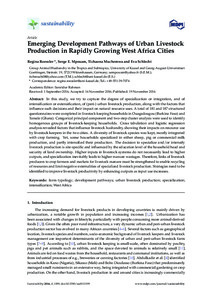Aufsatz
Artikel (Publikationen im Open Access gefördert durch die UB)

Emerging Development Pathways of Urban Livestock Production in Rapidly Growing West Africa Cities
Zusammenfassung
In this study, we try to capture the degree of specialization or integration, and of intensification or extensification, of (peri-) urban livestock production, along with the factors that influence such decisions and their impact on natural resource uses. A total of 181 and 187 structured questionnaires were completed in livestock-keeping households in Ouagadougou (Burkina Faso) and Tamale (Ghana). Categorical principal component and two-step cluster analysis were used to identify homogenous groups of livestock-keeping households. Cross tabulation and logistic regression analysis revealed factors that influence livestock husbandry, showing their impacts on resource use by livestock keepers in the two cities. A diversity of livestock species was kept, mostly integrated with crop farming. Yet, some households specialized in either sheep, pig or commercial milk production, and partly intensified their production. The decision to specialize and/or intensify livestock production is site-specific and influenced by the education level of the household head and security of land ownership. Higher inputs in livestock systems do not necessarily lead to higher outputs, and specialization inevitably leads to higher manure wastages. Therefore, links of livestock producers to crop farmers and markets for livestock manure must be strengthened to enable recycling of resources and limit negative externalities of specialized livestock production. Strategies need to be identified to improve livestock productivity by enhancing outputs as input use increases.
Zitierform
In: Sustainability. - Basel : MDPI, 2016, 8, 1199Förderhinweis
Gefördert durch den Publikationsfonds der Universität KasselSammlung(en)
Publikationen (Fachgebiet Animal Husbandry in the Tropics and Subtropics)Artikel (Publikationen im Open Access gefördert durch die UB)
Zitieren
@article{urn:nbn:de:hebis:34-2017062652691,
author={Roessler, Regina and Mpouam, Serge E. and Muchemwa, Tichaona and Schlecht, Eva},
title={Emerging Development Pathways of Urban Livestock Production in Rapidly Growing West Africa Cities},
year={2016}
}
0500 Oax 0501 Text $btxt$2rdacontent 0502 Computermedien $bc$2rdacarrier 1100 2016$n2016 1500 1/eng 2050 ##0##urn:nbn:de:hebis:34-2017062652691 3000 Roessler, Regina 3010 Mpouam, Serge E. 3010 Muchemwa, Tichaona 3010 Schlecht, Eva 4000 Emerging Development Pathways of Urban Livestock Production in Rapidly Growing West Africa Cities / Roessler, Regina 4030 4060 Online-Ressource 4085 ##0##=u http://nbn-resolving.de/urn:nbn:de:hebis:34-2017062652691=x R 4204 \$dAufsatz 4170 7136 ##0##urn:nbn:de:hebis:34-2017062652691
<resource xsi:schemaLocation="http://datacite.org/schema/kernel-2.2 http://schema.datacite.org/meta/kernel-2.2/metadata.xsd"> 2017-06-26T09:41:32Z 2017-06-26T09:41:32Z 2016-11-19 2071-1050 urn:nbn:de:hebis:34-2017062652691 http://hdl.handle.net/123456789/2017062652691 Gefördert durch den Publikationsfonds der Universität Kassel eng Urheberrechtlich geschützt https://rightsstatements.org/page/InC/1.0/ farm typology development pathways urban livestock production specialization intensification West Africa 630 Emerging Development Pathways of Urban Livestock Production in Rapidly Growing West Africa Cities Aufsatz In this study, we try to capture the degree of specialization or integration, and of intensification or extensification, of (peri-) urban livestock production, along with the factors that influence such decisions and their impact on natural resource uses. A total of 181 and 187 structured questionnaires were completed in livestock-keeping households in Ouagadougou (Burkina Faso) and Tamale (Ghana). Categorical principal component and two-step cluster analysis were used to identify homogenous groups of livestock-keeping households. Cross tabulation and logistic regression analysis revealed factors that influence livestock husbandry, showing their impacts on resource use by livestock keepers in the two cities. A diversity of livestock species was kept, mostly integrated with crop farming. Yet, some households specialized in either sheep, pig or commercial milk production, and partly intensified their production. The decision to specialize and/or intensify livestock production is site-specific and influenced by the education level of the household head and security of land ownership. Higher inputs in livestock systems do not necessarily lead to higher outputs, and specialization inevitably leads to higher manure wastages. Therefore, links of livestock producers to crop farmers and markets for livestock manure must be strengthened to enable recycling of resources and limit negative externalities of specialized livestock production. Strategies need to be identified to improve livestock productivity by enhancing outputs as input use increases. open access In: Sustainability. - Basel : MDPI, 2016, 8, 1199 Roessler, Regina Mpouam, Serge E. Muchemwa, Tichaona Schlecht, Eva doi:10.3390/su8111199 </resource>
Die folgenden Lizenzbestimmungen sind mit dieser Ressource verbunden:
Urheberrechtlich geschützt

